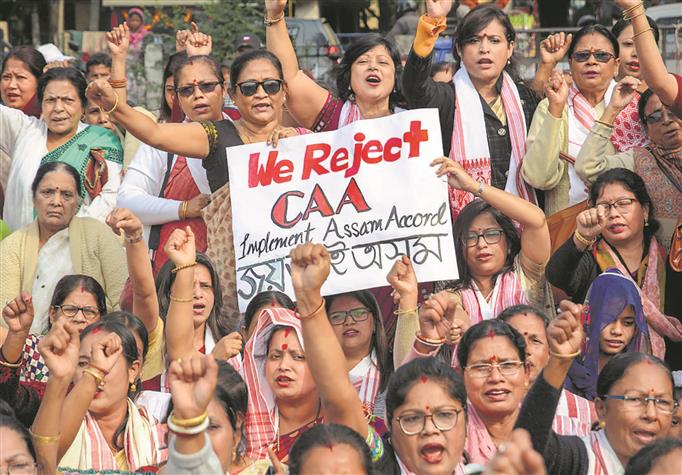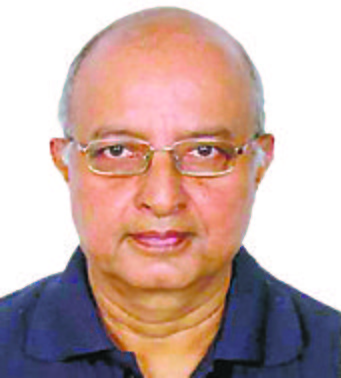
SPONTANEOUS OUTBURST: No protest can sustain itself unless there is public resentment, based on facts or perception, at its core.
AMITABHA BHATTACHARYA
AMITABHA BHATTACHARYA
Former Bureaucrat
THE capacity of the administrative State to deliver, without seriously denting the tolerant and inclusive ‘idea of India’, requires to be assessed carefully, especially in view of the large-scale protests against the Citizenship Amendment Act (CAA) and the declaration to get the National Register of Citizens (NRC) prepared for the entire country.
While the constitutionality of the CAA would be tested in the highest court, the prevailing angst, often turning violent, raises important questions. It is evident that no protest can sustain itself unless there is public resentment, based on facts or perception, at its core. Opposition parties often take advantage of the situation and give a direction to it. Their conduct, irrespective of the composition, having been strikingly similar over the past few decades, no government should be unprepared to face such flak. Also, when the public gets angry over issues like price rise, unemployment and increasing inequality, any additional move that could make them anxious and insecure can turn critical, causing widespread unrest.The current syndrome, in a way, may be reflective of this cumulative effect. If such dissatisfaction takes a provocative turn with anti-social elements joining the fray, prompting the police to take countermeasures, the situation may soon go out of control with attention focusing more on such measures instead of the main issues. And when the student community gets agitated, it is difficult for the government to win public sympathy. Understandably, the government should show maximal restraint and appear to be compassionate, flexible and strong. It is not easy.
What has caused such a perception of fear among large swathes of the population? It is nobody’s case that India should be a perennial ground for accommodating illegal migrants and infiltrators. For a variety of complex historical reasons — socio-cultural, religious, economic — the country has allowed and tolerated such influx over the decades since Independence. How to ensure that the borders are so sealed and secured that any possibility of further unauthorised entry is ruled out? How compassionately should the stock of millions of men and women, many living on the margins, be handled, keeping in mind their livelihood concerns? Linked with this is the question of the State’s right to impose reasonable restrictions, in terms of providing citizenship, on the existing migrants.
Although Assam and West Bengal are the two states most affected, for reasons not exactly similar, an amicable resolution of these contentious issues is clearly a national responsibility necessitating the Union and state governments to work in tandem. How would the administration cope with this gigantic task? What lessons has the government learnt, especially from major initiatives like demonetisation, implementation of the GST regime and the NRC exercise in Assam? Unless it is deeply conscious and appreciative of the fact that well-intended public policies often get distorted when implemented at the field level, especially where serious documentation is needed from most individuals, the government might continue to repeat the mistakes.
Having changed my residence within south Delhi recently, I know what problems are faced even to record a change of address. A close relative of mine, suffering from a terminal disease and incapable of movement, could not get her Aadhaar process completed, despite all efforts made at every level, before she passed away. The fear, therefore, of the due process and of the likely inconvenience and harassment that might follow, more so among certain categories, many of whom might be document-less, may not be all imaginary. Under the circumstances, the government may perhaps think of the following course of action.
Firstly, it should dispel fears. The provisions of the Act and its implications should be disseminated far and wide, in regional languages and in a tone that is reassuring.
Secondly, there should be serious deliberations — at political and administrative levels — about the lessons learnt from past actions and how best to ensure they are not repeated. The past experience should be duly documented and worked on. No policy can be termed effective unless implementation issues are thought through clearly in advance and incorporated in the policy itself. Acting in hurry often leads to repenting in leisure.
Thirdly, while the government has made its intentions clear, it should engage with genuine public leaders, particularly those who are sceptical of its motives, in order to assure them that the quasi-judicial process will not be undermined. How would one prove through documents, for instance, that he or she had come to India on account of religious persecution? Therefore, the process — administrative and judicial — should be so carefully devised, and the rules so sensitively framed that none gets mechanically excluded, just because of lack of adequate documentation.
Fourthly, the timing and phasing of the exercise is very important. Currently, the economy is passing through a bad patch and it is sought to be raised to the $5-trillion level in five years. As such, a careful assessment of the likely impact of this exercise on the country’s economy should first be made by credible economists. Pushing all engines at full throttle at this stage can put unprecedented stress on the already strained financial and administrative resources. Perhaps a pilot project in certain selected districts, in consultation with the states concerned, may be started at an appropriate time.
Finally, everything boils down to the question of trust. If that recedes, unpleasant consequences flow from ‘horrible imaginings’. In the present scenario, the government will definitely gain by showing some flexibility. Opening a meaningful channel of communication with the stakeholders will be a major step in building the desired trust.
Join Whatsapp Channel of The Tribune for latest updates.




























